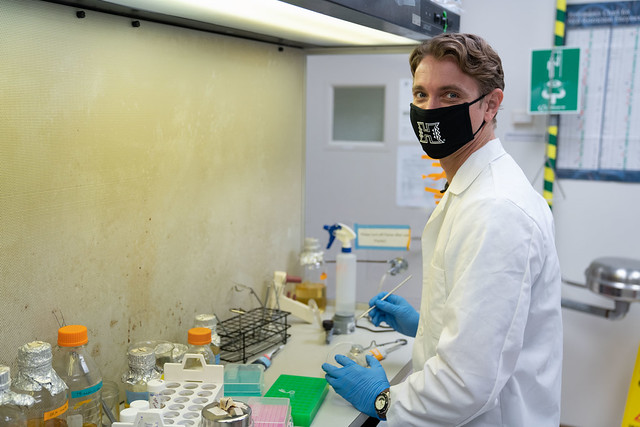
Making waves at the University of Hawaiʻi (UH) is the Institute for Biogenesis Research’s (IBR) youngest full-time faculty member, 36-year-old Jesse Owens. The National Institutes of Health (NIH) just awarded him $2.3 million dollars over the next five years to develop a new, safer and more efficient approach to gene therapy. He leads a team of collaborators at the UH John A. Burns School of Medicine (JABSOM), MIT and UC Davis.
Watch the video:
Owens’ grant, “Directed evolution of a sequence-specific targeting technology for therapeutic gene delivery to the human genome” addresses drawbacks to current genome editing technologies that randomly insert a therapeutic gene, which can disrupt important host genes and potentially cause cancer. Methods like CRISPR (clustered, regularly interspaced short palindromic repeats), a family of DNA sequences in genomes of organisms, are inefficient in non-dividing cells and delivering large DNA cargos. However, the technology that Owens is developing can direct large pieces of DNA to a safe location in the genome that can be used in all body tissues, both dividing and non-dividing, “which will allow us to cure more types of diseases.”
This grant is particularly noteworthy because it was a first-time submission and received a score in the 1st percentile, scoring more highly than 99% of all grants submitted from institutions across all 50 states in the US.
“This is an R01, which is the coveted personal grant that people get to do research… it’s bringing absolutely state-of-the-art technology that he’s inventing to do new gene therapy in Hawaii and this is why we’re very proud of him,” said Dr. Steven Ward, director of the IBR.
“Not only is he faculty here, he got his PhD here, he was trained here, he was raised on the Big Island,” said Ward. “He’s the product of that and it just shows you that Hawaii can do some of the world’s greatest biomedical research.”
In addition to the NIH funding, Owens recently signed a sponsored research agreement with a private company specializing in non-viral gene therapies called SalioGen Therapeutics. The goal of this collaboration is to advance the tools he is developing in the lab into clinical-stage gene therapy candidates.
Born and raised on Hawaiʻi island, Owens shares his Hilo High School alma mater with renowned Nobel Prize winner Jennifer Doudna, who developed CRISPR gene therapy. He hopes to inspire other children from Hawaiʻi.
“I think the schools here in Hawaiʻi are underestimated really, but you can succeed coming out of Hawaiʻi, for sure,” Owens said.
He was only 17 when he decided to dedicate his life to gene therapy research. “I have always been fascinated by the fact that genes can be moved around to serve a purpose,” said Owens. He has been inspired by the many researchers before him who have successfully used science to build tools to improve our lives.
Seeking to work with Dr. Stefan Moisyadi at the IBR, Owens earned his PhD in Cell and Molecular Biology from UH Mānoa in 2014 and now runs his own lab with 10 researchers.